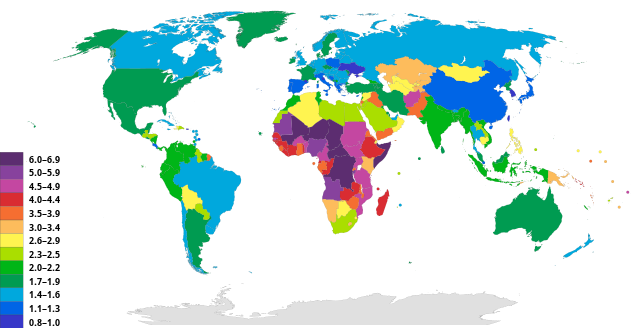Herbert Spencer talked about the survival of the fittest in nature. Humans are social animals that need to reproduce to continue their genetic legacy. According to new studies, the birth rate in America is falling, and people are quite concerned.
In the late nineties (1995-1999), women were willing to conceive 2.1 children on average, and women born in the mid-90s ( 1965-1969) were willing to have 2.2 children. Those were times when women were associated with housework and taking care of their children, but as time advanced, things changed.
Image Credit – Wikimedia Commons
What Has Changed Over Time?
Young adults are now more concerned about establishing a strong career before having a child. Sarah Hayford, the director of Ohio State’s Institute for Population Research, conducted a study. She revealed that Americans think that it is not wise to go ahead with family planning in these times if you don’t have enough resources. People are worried about the economy and the expenses that go into raising a child in a country like America.
Researchers referred to the data from the National Survey of Family Growth and asked people about the number of children they would prefer to have. Men prefer having fewer children than women, but the numbers haven’t changed in decades.
Image Credit- Pixabay
Factors Affecting The Birth Rate
There were times when we didn’t think much about the other factors, but now, as soon as the child is born, parents start thinking about health care, school, college and all sorts of other things. This difficulty in achieving their goal of having a child has led to a decline in the birth rate in America. In 2019, the lowest birth rate since the 1970s was reported to be 1.71.
The percentage of people who don’t want to have children at all has also increased, but that is not the sole reason for this decline in birth rates. Studies have revealed that people are avoiding having kids at a younger age, and as they reach their thirties, they realise that raising a child can be a tough job and give up the idea. They are now more focused on creating a comfortable lifestyle for themselves, and having a child in their early 20s seems to be a big responsibility. The exposure has increased, and no one wants to settle for anything ordinary.
The first steep fall in the birth rate was observed in the Great Recession of 2008, and ever since the birth rate has gone down. The United States is one of the most powerful and advanced countries but living in the USA has its ups and downs. Although the US is among the world’s largest economies, one can’t survive without working hard. Sarah Hayford concluded that we need to make the conditions more suitable for people so that they can plan families without having to worry much about health insurance, child care and other stuff.
To ‘science-up’ your feed, follow us on Instagram, Facebook or Twitter





1 comment
[…] alters the genetic material that can be passed down to future generations. This raises questions about the long-term implications and potential unintended consequences of manipulating the […]